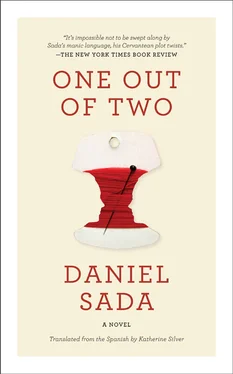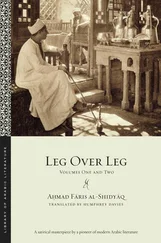Daniel Sada
One Out of Two
For Adriana Jiménez, my wife;
for Fernanda, our daughter.
Because he who loves
knows not what he loves
nor why he loves
nor what love is
— Alberto Caeiro
Now, how to say it? One out of two, or two in one, or what? The Gamal sisters were identical. To say, as people do, “They were like two peas in a pod,” the same age, the same height, and wearing, by choice, the same hairdo. Moreover, they both must have weighed around 130 pounds — let’s move into the present—: that is, from a certain distance: which is which? One is the other, and the other sometimes denies it, though always secretly, of course, because this business of having a double can be vexatious, almost almost leech-like, but it’s their own fault, because with each passing year they try ever harder to emulate each other. Their tics, gestures, and facial expressions, all the same, as if mirror images. Do they ever grow weary of one another? … Possibly, though if they did, their souls would be void. The thing is: their sole importance has only ever been this similitude — a double meaning that just might be single.
On the other hand: there are differences in the details. Constitución Gamal has a sizable beauty mark just above her right shoulder blade, whereas the other doesn’t: her name is Gloria and she is the more subdued of the two, the observer, so … This physical trait is easy to conceal: they wear clothes that cover that particular zone. For their daily attire: in the morning, whoever gets to it first decides for both, chooses the style and color, and the other simply consents … There’s no discussion, no sudden whims.
As for their personalities: one is discreet and the other a chatterbox, but this, too, can be managed: neither indulges excessively, as a rule. And their names? They swap them — why shouldn’t they! Their daily duties: they are seamstresses, and such perfectionists … Paltry, dullards. What began as an innocuous pastime became the profession that took hold.
Many years ago they set up shop here: in Ocampo: where they live without so much as a twinge of longing, confident that their daily and incessant toil will yield wonders, that good fortune is bound to result from great effort, that good fortune is a star unseen by any eye: all of these, safe deductions they have both pondered deeply. Very very deeply! The twins could even be considered prosperous, if by prosperity we mean never aspiring to more than a local outing, and if making do with little is a boon, so — let’s toast! because from time to time they celebrate their glorious life, at night they play records and dance. They get drunk: two, even three glasses each, when the next day is Saturday or Sunday.
They sew all their own clothes, empathically, logically, to avoid eccentricities that wouldn’t suit them anyway — their fabrics are all bargain basement — and their Singer pedal sewing machines are the mobile symbols of their inventiveness. The possibility that these machines might articulate delicacy, beauty, and intelligence remains a fantasy: unfounded. The strength of their legs also plays a part, strength that seems to be on the wane, because our twins: well, they don’t feel over the hill, but their faces — let’s just say, if they didn’t apply creams and lotions night and day, they’d look the worse for wear, though, from up close, that is … In spite of being forty, they still look exactly alike.
“One little slip, and you could be Gloria, and I, Constitución.”
“So what? Maybe we’d both come out ahead,” the other says sardonically, not believing a word of it.
“That means that old age might finally free us. We’ll have to learn about very sophisticated diets and ways of applying makeup, otherwise it’ll be really hard to stay the same.”
“But we aren’t old; forty years is nothing when there’s faith.”
“If God made us identical, he’s not going to play some dirty trick on us now that we’re all grown up,” she who is supposedly the most taciturn persuasively asserts.
“You’re right. People still can’t tell us apart from a distance, or even from up close … though not that up close.”
“Exactly, we’ll always be identical, you’ll see. We shouldn’t give up now,” come next, then: Gloria, with charming malice, lifts her finger as high as it can go, and Constitución imitates her with mirth. They’re both pretty dotty, and they’d love to start jumping around like a pair of rambunctious teens. But, standing there face-to-face, they feel ashamed for having spoken like that, and they return to their machines with their heads bowed.
These kinds of exchanges don’t carry much weight because there’s so much history between them, because their identity has been a long and difficult compromise, minute by minute and day by day forging them into one accidental and unambiguous joint spirit. One can almost say that the Gamal sisters are saints: a single pureness.
Hence, their repartee has always served to boost their flagging spirits and help them decide together what to do. That’s why the smart-alecky sassiness exhibited moments ago is a sure sign of senile bitterness, even if they do refuse to admit to it … And now let’s turn back to the past, a serene past until the following occurred: they were still young, around thirteen years old, and the only children of parents who often went away, when these perished in a highway accident. On that occasion, the Gamal sisters had been left alone, by parental edict, to reign over their home in Lamadrid — nor was this the first time — with no servants, neighbors, or friends to check in on them; this fact, alone, sheds light on the family’s social problems. Gloria and Constitución dealt with their seclusion by merrily sharing their daily chores. In fact, they never left the house, not even for a breath of fresh air, even though they could: why should they, for heaven’s sake! Moreover, their parents didn’t leave them a single peso, though they had enough provisions to last approximately two weeks.
Truth be told, the girls never wondered why their parents didn’t consider taking them along on their extended jaunts, but this solitude both imposed and shared was a lasso of sorts that their Lord or their future, or maybe even the Devil, had tossed to them. Those days spent on their own were grand days of apprenticeship: a flourishing sisterhood coming into its own right: because they invented games till they grew drowsy, cooked up all kinds of dishes, and talked about what they would do when they grew up. On that particular occasion, at least at first, they delighted in their parents’ prolonged absence, but … to put it in other words: one week: fine; two weeks: who cares! But by the third: what’s going on here?: their distress was subtly gathering steam. By the fourth week, the twins began to feel pangs from the lack of food, and even worse, the total absence of news.
The parents’ punishment for leaving their daughters in the lurch came abruptly: they got totaled! Soledad Guadarrama, their aunt from Nadadores, found the famished girls curled up in bed: cowering under the blankets. Without a second thought, she went straight to the nearest store and returned with pounds of meat and medicinal salves to revive them. A miracle was wrought … after which, with a minimum of tact, she told them the naked truth:
“Your parents were killed in a highway accident. Apparently, it was horrible; according to the report, their heads got severed, but they were identified anyway. The only solace I can offer you: your dead parents were given a Christian burial in the Múzquiz cemetery.”
Читать дальше












